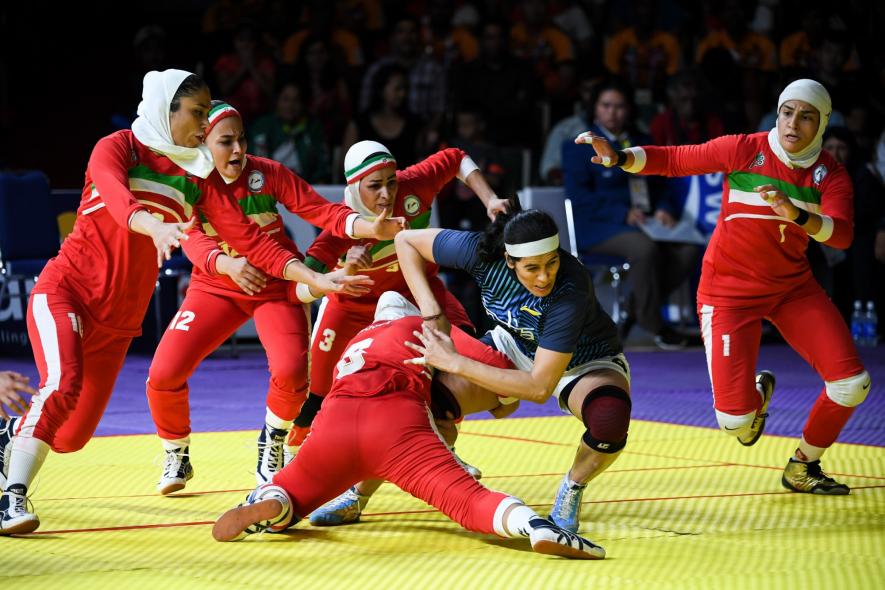Selection Farce and Missing Asian Games Teams: Indian Kabaddi Hits New Low

The Indian women's kabaddi team (in pic) lost to Iran in the final of the Asian Games in Jakarta to settle for silver medal, while the men returned with bronze (Pic: IANS).
If you thought the missed gold medals and the historic losses of the national teams at the 2018 Asian Games in Jakarta was the lowest point for Indian kabaddi, then brace yourself... the storm is just brewing. If the sham that happened in the name of a court-mandated ‘selection trial’ at the KD Jadhav Wrestling Hall is anything to go by, Indian kabaddi is in for an easily avoidable period of tumult. And, as usual, the players (therefore the game itself) will be the only casualties.
At noon on September 15, a small group of former kabaddi players, officials, court observers and the media convened at the wrestling hall to witness what was touted as a landmark match that would pit men and women who represented India at the Asian Games against two teams selected from a pool of players overlooked by the Amateur Kabaddi Federation of India (AKFI) ahead of the Asiad. The unprecedented order came about after two former Kabaddi internationals, Arjuna awardees C Honnappa Gowda and S Rajrathanam, filed a case at the Delhi High Court, alleging widespread corruption in the selection process, implying that the teams that were sent to Indonesia were not India’s best.
The court was convinced that things were not right.
Also Read | Corruption and Mismanagement Rule Indian Sport; Kabaddi's Story at the Asian Games Tells Us Why
However, since the order to hold fresh trials came on August 17, too late for the Asian Games began on August 18, the High Court ordered the trial matches be held after the continental competition to ascertain the quality of the teams after they contend with the freshly selected squads. The matches were supposed to happen on September 15, at least that’s what the petitioners, their legal team and a breakaway faction of Indian Kabaddi (National Kabaddi Federation of India - NKFI) believed.
The AKFI, on the other hand, maintained that no such matches were mandated by the High Court, and what was being held on the day were selection trials to pick the best players in the country. This view was reflected by the administrator, Justice (retd.) SP Garg, as well (In a related case, Delhi High Court also removed incumbent president of the AKFI, Mridul Gehlot, from office and handed over the affairs of the federation to Justice Garg, who would act as an interim administrator overseeing free and fair elections of the body, starting from the district units to the national federation).
Justice Garg declined to comment on the court order or the supposed trial matches against the Asian Games teams. “My job today is to observe the selection process and share my findings with the court. I don’t want to comment on anything else at this moment,” said the former Delhi High Court judge.
The petitioners held up their end of the bizarre, real-life satire on the other side of the wrestling hall. They paraded teams of men and women, dressed in NKFI jerseys in bright neon, and lamented the state of the sport. Between the two sides of the hall, divided in perfect symmetry, there was no communication. Their lawyer, Bharat Nagar, pointed out that if the matches didn’t happen, it would amount to “contempt of court”. He added: “We will take this up with the court in the next hearing [scheduled for October 30] and it is clear that the AKFI has completely disregarded the High Court’s directive.”
Amidst the verbal charges, counter charges and arguments, what was getting drowned was the collective sighs of the two teams, comprising of players who were selected after a 20-day camp in Bengaluru (conducted by the NKFI). The men and women had finished their warm-up routine and were “ready to play” the Indian Asian Games sides. They stood, taking in what was clearly an insult to their sport as well as themselves, even as Indian kabaddi’s power players fought over the fineprint and technicalities of a court order.
Also Read | Jithin Paul vs NADA: Doping and the Indian Athlete
The players, keen to play, keen to make a mark, may never comprehend the bleak symbolism in what was happening around them. The men’s team captain, Bijay Singh, said he was disappointed they were not getting to show their real worth. He also alleged that there were many more players who would have loved to be part of the teams but stayed away as they were threatened by the AKFI.
“We have trained well and we wanted to show our mettle here,” said the player from Madhya Pradesh. “We had a good camp in Bengaluru. The final squad was selected from a pool of more than 100 players from across the country.”
According to him several other players would have joined the camp if it weren’t for less than subtle threats that participation would lead to cancellation of contracts with the new and highly lucrative Pro Kabaddi League (PKL).
Bijay’s allegation may or may not stick in a court of law. But if precedent is anything to go, he can’t be too far off the mark. There are examples in several major sports, including cricket and hockey, of boards or federations treating players as commodities to be controlled and profited from.
While in every aspect of “real life” we talk about the inherent need for competition, in sport we end up supporting monopolies. Iran has improved dramatically at kabaddi because some of their key players are free to come to India and play at a much higher level. But Indian athletes who wish to better themselves by playing in stronger competitions are often not afforded that choice because the board doesn’t get a slice of that pie.
Also Read | Sardar Singh: India’s First World Class Modern Hockey Star
This is one of the many realities of Indian sport that the court, perhaps, recognised when it heard this case. The petitioners’ case will undoubtedly also be influenced by the Asian Games defeats.
“It was not just the losses against Iran. The men lost to Korea too,” said Gowda. “Two losses in a tournament where we have never lost. Now that shows you how the team composition was. And the players are not to be blamed here. Our fight is against the corrupt way the game is being run by the AKFI and how a family [of Janardhan Singh Gehlot] have been holding onto the sport of kabaddi as their private property.”
While the AKFI election as per the directives of the National Sports Code, even the rival NKFI’s for that matter, is something that will take probably years to sort out, the immediate agenda at the KD Jadhav Wrestling Hall was a straightforward selection trial.
The AKFI was keen to hold that trial to present evidence to the court that they had worked towards conducting it. But what actually transpired on the playing mat was a farce of the highest order.
Also Read | India at Asian Games 2018: The Truth Behind Government's Claims
Newsclick approached several women players who had lined up to play in the trials. It was evident from the prints on their jerseys that a vast majority were from the Delhi NCR region, and many were not even seniors. “We have played for the Delhi state junior team,” said one of the players, who added that she had no idea what the selection trails are for. “Our coach asked us to be present at the stadium for a trial. We are here to play. We were not told what it is for,” she said. All the players on this side of the hall asked us not to use names, and declined to comment on camera, because they feared repercussions. Many of the girls, who went through a registration process at the venue, were teenagers.
When the matches began, it was clear that these were committed and talented young players eager to take any chance to perform for this crowd of (much older) men who hold the power to change their lives dramatically. But to claim this was a cross section of the best kabaddi talent in India would be a blatant misrepresentation.
“You think these kids could play and win against Iran? Asked a bemused Rajrathanam. “They are school and college kids, and they are being brought here just to make a show that the selection trials were held. There are real teams are ready to play [the ones selected after a camp in Bengaluru], but the Asian Games sides are absent.”
The court, in its order, had asked the AKFI to hold trials after announcing it though various communication channels as well as on their website well in advance so that players from across the country can be part of it. According to the petitioners, the federation just published a single-line message on its website about the trials a couple of days back.
It is clear that the AKFI were displaying a certain amount of arrogance while conducting a trial match in which the players present were substandard. They are walking a fine line, seemingly complying with the court directives, but actually not putting any effort to do justice to the process.
Similar arrogance was evident in how the teams were selected for the Asian Games. In its haste to name players, and select “certain names”, India’s teams went in with raiders and all-rounders but no proper defenders. India, having dominated kabaddi at all international levels, were over-confident, and went in with the notion that gold was a given. Ultimately, Iran and Korea were on hand to provide a reality check. But the arrogance of the Indian establishment remains.
“The players understand what is needed to be done on the court to win,” said Rajrathanam. “It is the federation who selected a weak team. I have been a player, I am a coach now. If you ask honest kabaddi players to take charge of the selection process I can guarantee we will beat Iran any day.”
However, things are not just about the loss against Iran here. Gowda pointed that out when he expressed his disappointment at how his sport is being disgraced, and not just by losses on the international stage, but by corruption at every level.
“When we put on the national jersey, there is a certain amount of pride that we do it with,” he said. “In Kabaddi, we were the best in the world, I believe we are still. Then again, what has happened today, the drama in the name of a selection trial, and the things that led to the Asian Games debacle, is disgracing the game. This has not started today, though, and things can only get better if democracy is brought back to Indian kabaddi.”
Get the latest reports & analysis with people's perspective on Protests, movements & deep analytical videos, discussions of the current affairs in your Telegram app. Subscribe to NewsClick's Telegram channel & get Real-Time updates on stories, as they get published on our website.
























